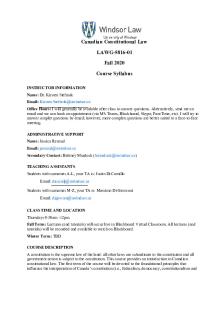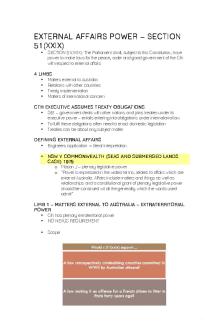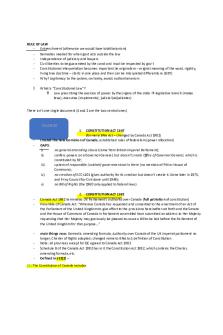Constitutional Law PDF

| Title | Constitutional Law |
|---|---|
| Course | Constitutional Law |
| Institution | University of Tasmania |
| Pages | 5 |
| File Size | 143.1 KB |
| File Type | |
| Total Downloads | 25 |
| Total Views | 175 |
Summary
Summary on lectures and content...
Description
CONSTITUTIONAL LAW Module 1: Introduction Lecture 1: Coleman v Power: Mr Coleman was making pamphlets that alleged corruption in Queensland police force. In making the allegations, senior police force members were engaged in criminal activities. Mr Powers came up to Mr Coleman and said don’t distribute those, and Mr Coleman said “I know my rights”. Constable Powers said No I order you to stop, you are obstructing the flow of traffic in the mall and creating public nuisance. He refused. At which point the police officer placed his hand on him and said I am removing you from the mall. Mr Coleman shouted ‘this is Constable Brendan Powers a corrupt police officer’. The police officer then arrested him. Coleman succeeded.
Double Pronged Invalidity test: 1. Test/challenge the arraignment as being outside the scope fo the legislation 2. Police officer had the power but the legislator nevler had the power to write that Act in the first place.
Lecture 2: Part 1 Guest Speaker (Solicitor General, Michael O’Farrell) He advises state government about the law. He needs to meet state and federal colleagues three times a year Melbourne Corporations Case: - Government cant legislate to deprive the essential functions of the executive
Commonwealth only exists because of the states, this is because in the late 19th century they decided the commonwealth shouldn’t and that states then became states in their on rights. So in Tasmania’s case the source of legislative power is an empirical act and still is to this day Executive is responsible to the parliament (legislature) which is responsible to the electorate. So if things arnt going well the electorate can change things every 4 years. So to the extent that these features are shown in the constitutional framework of Tasmania, they are found in the composition and powers of the legislature and also the requirement the legislature must be elected and s 41 A, effective as 4 year terms However the concept of responsible government is illusive, this is because it evolves all the time. Eg- Until John Howard became prime minister, basically, the bureaucracy was tenured and basically entrenched. Senior advisors were senior ministers? There was a layer of advisors between the beurecracy and the politicians.
Egan v Willis: Egan v Chadwick Both involve the demanding of certain documents by the NSW parliament to the treasurer (Egan) who was removed and claimed that he cannot be removed because he was an elected member. The courts held there was a power to remove someone from court and that the court did not have the power to tell the parliament when this was to be used. Held that there is an assumption that the legislature will deal with these problems. - The court will generally not descend into legal issues of the parliament - S106 and 107 confer power to the stats to legislate - Grant of exclusive legislative powers to the commonwealth separation of powers
Lecture 3: Constitutional Litigation and Interpretation: - Australia has fixed constitution - S128 has a process on which the constitution is reformed - The reform process is it has to pass both houses by 2/3. There is a really high bar. About 95% fail. Big attempt was in 1999, John Howard did not want us to become a republic, gave us the option and everyone said no. - Others include removal of parts that discriminated against aboriginals and women not being allowed to vote - Cannot just use the words of the constitution, or the ordinary meaning. This is because they tend to be very vague, (constitution saying queen is in power of the executive, this is not the case, therefore the constitution contains a lot of untrue ideas). - In judicial power you would have looked at Boilermakers that say federal judicial power shall not be exercised by a non judicial power, and that a non-judicial power should not exercise non judicial power. This is not mentioned in the constitution, the High court has created this themselves. - Arbitration and exercise of judicial power are different. Court says there should be a court of conciliation and arbitration etc Kirby J in Grain Pool: A constitution is a special law, not the same as an ordinary statute. Its purpose requires the heads of law making power should be given an ample construction because their object is to afford indefinitely and from age to age, authority to the federal parliament to make laws responding to different times and changing needs. 1. Practical Questions 2. Rules of interpretation
3. Schools of interpretation= Diffeent judges approach the questions from different ways. From the High court there are literalist judges and then there are positivist judges who are much more liberal in their interpretation. Then have to convince fence sitting judges that the line of authority is the right one. 4. Influences on interpretation 5. Practical examples
1. What are you seeking? Normally seeking ‘prerogative writs’ (75 (v)) - Injunction= Refrain to not do something. Hold the consequences of an official action that has been undertaken or planned to be - Prohibition= Stopping an action - Mandamus= Tell someone to do something, not dissimilar to injunction but it is saying you have to perform a statutory duty or a judicial duty - Certiorari 2. Do you have standing? Long history of judicial caution in relation to the standing of private individuals to challenge the validity of statutes absent some particular or special interest to be advanced by such challenge… in Australia in the formulation [is] a ‘private or special interest’ test for standing’ per French CJ in Pape 3. Intervening - Judiciary Act 1903 (Cth), ss 78A, 78B If there be jurisdiction apart from s78A to allow non-party intervention… its exercise should not affect the legal interests of persons who have not had an opportunity to be heard. Therefore, a non-party whose interests would be affected directly by a decision in the proceeding –that is, one who would be bound by the decision albeit not a party – must be entitled to intervene to protect the interest liable to be affected. - Joined intervention - Amicus Curiae (Amici intervention) “ Applicants for leave to intervene must ordinarily should an interest in the subject of litigation greater than a mere desire to have a law declared in particular terms… As to [an] applicant to be heard as amicus curiae [the applicant must] show that the parties whose cause he would support are unable or unwilling adequately to protect their own interests or to assist the Court in arriving at the correct determination of the case - Kruger v Commonwealth (1996) 3 Leg Rep 14. - Rule about intervening as an ordinary party is deal with in one. In Kruger v Commonwealth, the citation is because prior to the case there is ?interocraty? proceedings.
4. Amici - Levoy v Victora (1997) 189 CLR 579, pe Brennan J at 604 - Wurridjal v Commonwealth (2009) 237 CLR 309, per French CJ at 312-3
1. What is in contest? - Meaning of words - Application/ Scope of sections - Interactions/delineation between provisions and powers - Inclusion of external constitutional principles - Implications of words/sections/structure 2. The Rules of Constitutional Interpretation “ The constitution contains no injunction as to how it is to be interpreted. Any theory of constitutional interpretation must be a matter of conviction based on some theory external to the constitution itself. But once the people have agreed to be governed by a constitution enacted by a British statute, it is surely right to conclude that meaning must be determined by the ordinary techniques of statutory interpretation”- McGinty per McHugh J 3. Problems with traditional rules of SI “Consittuonal Interpretation is no mechanical task. The constitision is no ordinary statute/” Kartinyeri v Commonwealth - Generality of statute - Lack of definitions - Assumptions beyond the text -WHOSE purpose/intention? * Enacting parliament *Founders? *Contemporary society? (Popular sovereign/Social Contract) *Should ‘the subjective intentions of the framers… fetter te rpesent and the future to the distant past”?
WEEK 3: METHODS OF CONSTRUCTION 1. Construction- > Overral, meaning/Purpose (constitutional power)
2. Characterisation 1. Core Power 2. Incidentality 3. Connextion of Plt Law/ exec action 1. Proportionality between the two...
Similar Free PDFs

Constitutional Law
- 5 Pages

Constitutional law syllabus
- 13 Pages

Citizenship Constitutional Law Notes
- 10 Pages

Constitutional-Law-Flowchart
- 8 Pages

Constitutional Law model questions
- 42 Pages

Constitutional Law 4 limbs
- 7 Pages

Constitutional Law 1- Bernas
- 1,442 Pages

Constitutional Law Reviewer
- 227 Pages

Week 5- Constitutional Law
- 44 Pages

Constitutional Law Reviewer midterm
- 161 Pages

Australian Constitutional Law Notes
- 65 Pages

Constitutional LAW Outline
- 73 Pages

LS1537 - UK Constitutional Law
- 6 Pages

Constitutional Law Outline
- 30 Pages

Constitutional Law Map
- 15 Pages
Popular Institutions
- Tinajero National High School - Annex
- Politeknik Caltex Riau
- Yokohama City University
- SGT University
- University of Al-Qadisiyah
- Divine Word College of Vigan
- Techniek College Rotterdam
- Universidade de Santiago
- Universiti Teknologi MARA Cawangan Johor Kampus Pasir Gudang
- Poltekkes Kemenkes Yogyakarta
- Baguio City National High School
- Colegio san marcos
- preparatoria uno
- Centro de Bachillerato Tecnológico Industrial y de Servicios No. 107
- Dalian Maritime University
- Quang Trung Secondary School
- Colegio Tecnológico en Informática
- Corporación Regional de Educación Superior
- Grupo CEDVA
- Dar Al Uloom University
- Centro de Estudios Preuniversitarios de la Universidad Nacional de Ingeniería
- 上智大学
- Aakash International School, Nuna Majara
- San Felipe Neri Catholic School
- Kang Chiao International School - New Taipei City
- Misamis Occidental National High School
- Institución Educativa Escuela Normal Juan Ladrilleros
- Kolehiyo ng Pantukan
- Batanes State College
- Instituto Continental
- Sekolah Menengah Kejuruan Kesehatan Kaltara (Tarakan)
- Colegio de La Inmaculada Concepcion - Cebu
